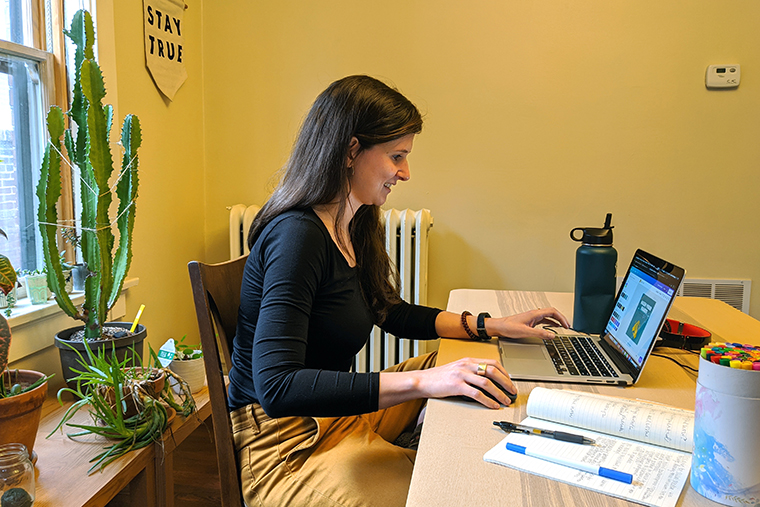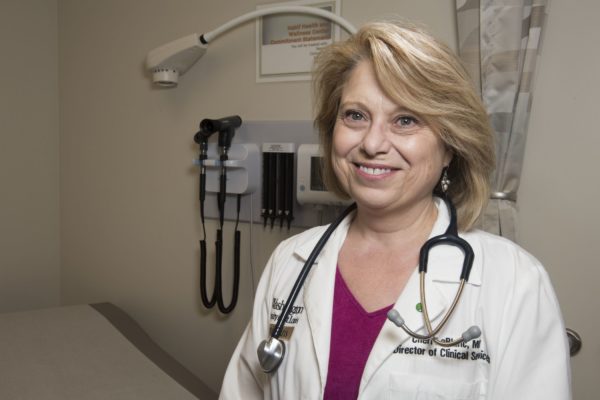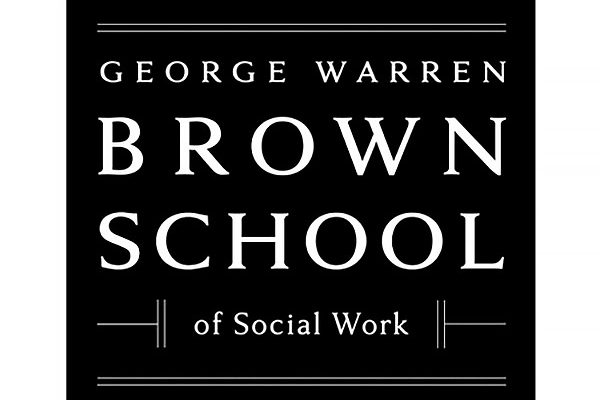Like most in the immediate aftermath of the announcement of major changes in campus life at Washington University in St. Louis, the staff at the Habif Health and Wellness Center was working overtime to accommodate the needs of students scattered all over the country — and the world.

“The past week has been one of constant change,” said Brad Kinnear, associate director of mental health services of Habif, which offers everything from medical appointments to mental health services to wellness education. “But we’re able to contact students by phone, provide support and coping strategies and refer them to as many resources as we can.”
To that end, the Habif Center is working to reach students — online and by phone — to provide consultation and support, getting information out through any and all channels.
“So much of our work relies on interacting with students,” said Jordan Worthington, assistant director of mental health outreach and programming, who manages Habif’s Instagram account and helps develop content for all social media channels. “Everyone’s work is shifting, and our work will have to shift, too. We’re doing everything we can to meet students where they are.”
Which means in addition to its website, @washu_habif on Instagram will be an important hub for the near future, and the staff is working on new and creative ways to get its messages across: Everything from guided meditations to manage stress to peer-to-peer videos on how WashU students are practicing self-care to tutorials on finding therapists at home.
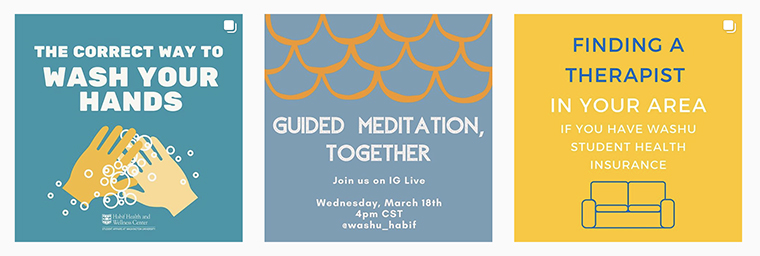
“None of us have a roadmap for what this is going to look like,” Worthington said. “This is still new for us, too, and because these platforms are very nimble, we’re looking at how we interact as we go.
“We’re getting more strategic about it and developing a schedule so we’re not overwhelming our audience. At the end of the day, fostering connection is what it’s all about,” Worthington said. “Social distancing and isolation doesn’t mean we can’t connect.”
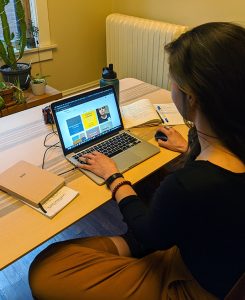
Here’s a sampling of some recent content on Habif’s Instagram account that is helping the Washington University community — students, faculty, staff and even alumni, deal with the new reality brought on by COVID-19.
- Create structure and routine where you can. So much is out of our control right now. If you can, try the following: Establish a daily and weekly routine for yourself. Set a schedule and daily goal. Practice personal hygiene and get dressed as you normally would.
- Engage in healthy habits. You’re definitely a hand-washing pro at this point. Where you’re able, continue to take care of your health by getting 7-8 hours of sleep. Eat well. Make time for movement, like a walk outside or free YouTube yoga or workout videos.
- Avoid unhealthy coping strategies. Tempting as they may be, overuse of alcohol, junk food, sleeping all day, social media, or compulsive spending won’t help in dealing with big emotions.
- Focus on what you can control. Admittedly, so much can feel out of control right now. What can you control? Washing your hands. The amount of news media you consume. Taking full, deep breaths periodically. Make a list of what else is in your power and focus on those.
- Unplug. Limit the amount of time you devote to stressful news coverage. Set a time, and give yourself that amount of time once or twice or day. When you pay attention to news, make sure you’re consulting reputable sources with solid medical and public health backing.
- Connect with your support system. Reach out to those who support and energize you. Be open about how you’re feeling, and hold this space for others as well. Schedule regular video chats to check in.
- Tap into this moment. Being mindful won’t make your anxiety go away, but it can change your relationship to it. Can you rest with the sensation of your body breathing, feeling what it feels like to be you in this very moment? Notice where your worry lives in your body. What does it feel like? How is it changing over time? How can you hold space for big emotions?
More resources like these tips are available on the Habif website, including a Mindfulness and Meditation page, which will conduct, in the coming weeks, virtual guided meditation sessions.
In addition, Washington University students can access coping strategies online through a program called TAO (Therapy Assistance Online), which provides well-researched and highly effective strategies to help overcome anxiety, depression and other common concerns. Students can gain access to TAO’s self-help website here.
Many helpful guides are available online to manage stress and anxiety related to COVID-19. Here are five that the Habif Health and Wellness Center has recommended to students:
Coping with Stress During the 2019-nCoV Outbreak (World Health Organization)
Taking Care of Your Mental Health in the Face of Uncertainty (American Foundation for Suicide Prevention)
5 Tips to Help Regain Calm Amidst COVID-19 Panic (National Public Radio)
How to Cope with Anxiety About Coronavirus (Verywell Mind)
Feeling Anxiety About Coronavirus? A Psychologist Offers Tips to Stay Clearheaded (Universithy of California, San Francisco)
WashU Response to COVID-19
Visit coronavirus.wustl.edu for the latest information about WashU updates and policies. See all stories related to COVID-19.
